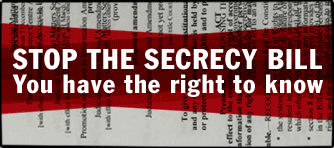 The National Council of Provinces (NCOP) seem set to refuse to adopt amendments to the Protection of State Information Bill (known as the secrecy bill) that would protect the right of ordinary people to access information from the government, a right currently enshrined in the Constitution and practically realised in the Promotion of Access to Information Act (PAIA).
The National Council of Provinces (NCOP) seem set to refuse to adopt amendments to the Protection of State Information Bill (known as the secrecy bill) that would protect the right of ordinary people to access information from the government, a right currently enshrined in the Constitution and practically realised in the Promotion of Access to Information Act (PAIA).
However, based on the level of debate by the NCOP Ad Hoc Committee considering the bill it is difficult to determine whether the threat to the right is intentional or reflects a lack of understanding of the existing right within government.
The bill regulates the same information as PAIA
Since the introduction of the secrecy bill access to information experts have been asking why the bill is necessary, given that access to information is already regulated under PAIA, which protects information that could reasonably be expected to prejudice the defence, security or international relations of the state from release to the public.
The minutes of the NCOP meeting on 9 May prepared by the Parliamentary Monitoring Group reveal that the government's actions in creating a bill that repeats work already done by PAIA are likely caused by a fundamental lack of understanding within government about the role and effect of PAIA:
Ms Ntwanambi (ANC) asked for clarity as to why [the bill] would contravene PAIA, which did not necessarily deal with matters of state information.
Mr Guanda (ID) responded that PAIA was a law under which information could be accessed from the state.
The Chairperson (ANC) interjected to note that the words proposed were "classified state information".
Mr Lees (DA) remarked that PAIA covered all information, valuable or classified, personal, public and company information. Therefore all state information fell under the ambit of PAIA.
Ms Ntwanambi said that if this was correct, there would not have been a need to have other legislation. This bill did not deal with general information. PAIA was specific to "information" and not "classified state information".
The answer is simple: PAIA regulates access to records of public and private bodies. A ‘record' is defined in PAIA to mean any recorded information regardless of form or medium; in the possession or under the control of that public or private body; and whether or not it was created by that public or private body.
PAIA therefore regulates access to all records held by all public bodies, including access to classified information.
Ms Ntwanambi's logic may therefore be applied consistently with that of numerous access to information experts - given PAIA already regulates access to all types of government information there is no need for the secrecy bill. Which begs the question, why has the government introduced the bill?
The bill will trump PAIA
Comments of the committee also reveal the lack of understanding of the relationship between the bill and PAIA.
Mr S Mazosiwe (ANC) said that the Constitution tried to create a balance between access to information and the interests of the state in protecting that information. [The provision in the bill] was seeking to smooth the role of PAIA, and was bringing it to greater prominence.
Far from bringing PAIA to greater prominence, clause 1(4) of the bill will remove PAIA as the authoritative legislation in determining restrictions on the right to information. As a result, the bill will trump PAIA and extend the grounds on which public bodies can refuse people access to information, allowing access to be refused solely on the basis of classification.
Despite these issues being raised in many public submissions, the committee's discussions reveal that there remains a fundamental lack of understanding within the committee on this issue.
Read SAHA's submission on the secrecy bill.





 The National Council of Provinces (NCOP) seem set to refuse to adopt amendments to the Protection of State Information Bill (known as the secrecy bill) that would protect the right of ordinary people to access information from the government, a right currently enshrined in the Constitution and practically realised in the Promotion of Access to Information Act (PAIA).
The National Council of Provinces (NCOP) seem set to refuse to adopt amendments to the Protection of State Information Bill (known as the secrecy bill) that would protect the right of ordinary people to access information from the government, a right currently enshrined in the Constitution and practically realised in the Promotion of Access to Information Act (PAIA).